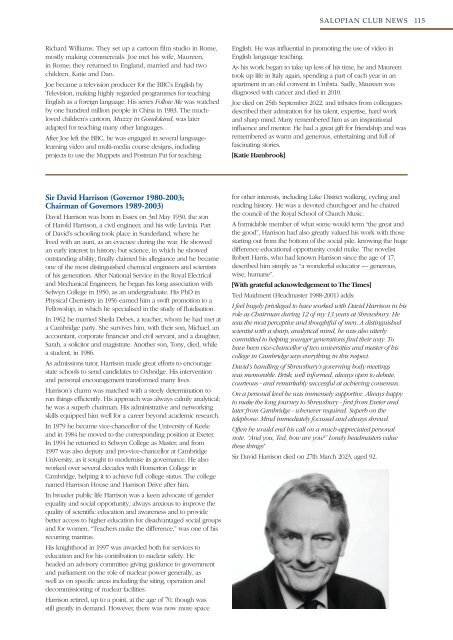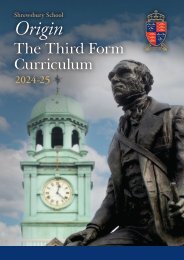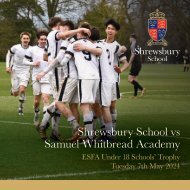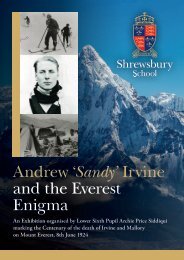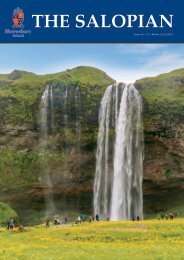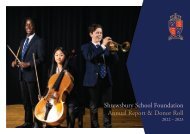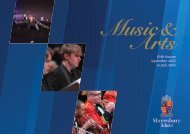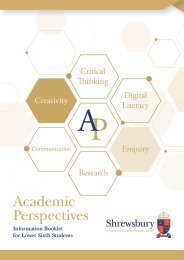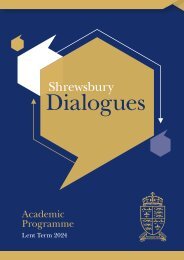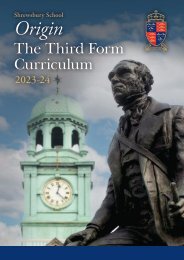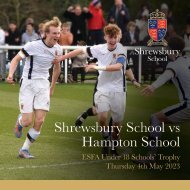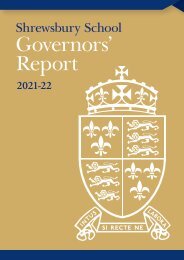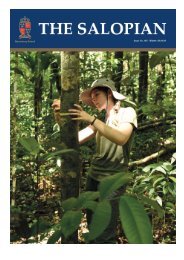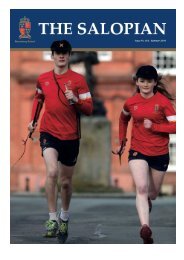The Salopian Summer 2023
v2
v2
Create successful ePaper yourself
Turn your PDF publications into a flip-book with our unique Google optimized e-Paper software.
SALOPIAN CLUB NEWS 115<br />
Richard Williams. <strong>The</strong>y set up a cartoon film studio in Rome,<br />
mostly making commercials. Joe met his wife, Maureen,<br />
in Rome; they returned to England, married and had two<br />
children, Katie and Dan.<br />
Joe became a television producer for the BBC’s English by<br />
Television, making highly regarded programmes for teaching<br />
English as a foreign language. His series Follow Me was watched<br />
by one hundred million people in China in 1983. <strong>The</strong> muchloved<br />
children’s cartoon, Muzzy in Gondoland, was later<br />
adapted for teaching many other languages.<br />
After Joe left the BBC, he was engaged in several languagelearning<br />
video and multi-media course designs, including<br />
projects to use the Muppets and Postman Pat for teaching<br />
English. He was influential in promoting the use of video in<br />
English language teaching.<br />
As his work began to take up less of his time, he and Maureen<br />
took up life in Italy again, spending a part of each year in an<br />
apartment in an old convent in Umbria. Sadly, Maureen was<br />
diagnosed with cancer and died in 2010.<br />
Joe died on 25th September 2022, and tributes from colleagues<br />
described their admiration for his talent, expertise, hard work<br />
and sharp mind. Many remembered him as an inspirational<br />
influence and mentor. He had a great gift for friendship and was<br />
remembered as warm and generous, entertaining and full of<br />
fascinating stories.<br />
[Katie Hambrook]<br />
Sir David Harrison (Governor 1980-2003;<br />
Chairman of Governors 1989-2003)<br />
David Harrison was born in Essex on 3rd May 1930, the son<br />
of Harold Harrison, a civil engineer, and his wife Lavinia. Part<br />
of David’s schooling took place in Sunderland, where he<br />
lived with an aunt, as an evacuee during the war. He showed<br />
an early interest in history; but science, in which he showed<br />
outstanding ability, finally claimed his allegiance and he became<br />
one of the most distinguished chemical engineers and scientists<br />
of his generation. After National Service in the Royal Electrical<br />
and Mechanical Engineers, he began his long association with<br />
Selwyn College in 1950, as an undergraduate. His PhD in<br />
Physical Chemistry in 1956 earned him a swift promotion to a<br />
Fellowship, in which he specialised in the study of fluidisation.<br />
In 1962 he married Sheila Debes, a teacher, whom he had met at<br />
a Cambridge party. She survives him, with their son, Michael, an<br />
accountant, corporate financier and civil servant, and a daughter,<br />
Sarah, a solicitor and magistrate. Another son, Tony, died, while<br />
a student, in 1986.<br />
As admissions tutor, Harrison made great efforts to encourage<br />
state schools to send candidates to Oxbridge. His intervention<br />
and personal encouragement transformed many lives.<br />
Harrison’s charm was matched with a steely determination to<br />
run things efficiently. His approach was always calmly analytical;<br />
he was a superb chairman. His administrative and networking<br />
skills equipped him well for a career beyond academic research.<br />
In 1979 he became vice-chancellor of the University of Keele<br />
and in 1984 he moved to the corresponding position at Exeter.<br />
In 1994 he returned to Selwyn College as Master, and from<br />
1997 was also deputy and pro-vice-chancellor at Cambridge<br />
University, as it sought to modernise its governance. He also<br />
worked over several decades with Homerton College in<br />
Cambridge, helping it to achieve full college status. <strong>The</strong> college<br />
named Harrison House and Harrison Drive after him.<br />
In broader public life Harrison was a keen advocate of gender<br />
equality and social opportunity, always anxious to improve the<br />
quality of scientific education and awareness and to provide<br />
better access to higher education for disadvantaged social groups<br />
and for women. “Teachers make the difference,” was one of his<br />
recurring mantras.<br />
His knighthood in 1997 was awarded both for services to<br />
education and for his contribution to nuclear safety. He<br />
headed an advisory committee giving guidance to government<br />
and parliament on the role of nuclear power generally, as<br />
well as on specific areas including the siting, operation and<br />
decommissioning of nuclear facilities.<br />
Harrison retired, up to a point, at the age of 70, though was<br />
still greatly in demand. However, there was now more space<br />
for other interests, including Lake District walking, cycling and<br />
reading history. He was a devoted churchgoer and he chaired<br />
the council of the Royal School of Church Music.<br />
A formidable member of what some would term “the great and<br />
the good”, Harrison had also greatly valued his work with those<br />
starting out from the bottom of the social pile, knowing the huge<br />
difference educational opportunity could make. <strong>The</strong> novelist<br />
Robert Harris, who had known Harrison since the age of 17,<br />
described him simply as “a wonderful educator — generous,<br />
wise, humane”.<br />
[With grateful acknowledgement to <strong>The</strong> Times]<br />
Ted Maidment (Headmaster 1988-2001) adds:<br />
I feel hugely privileged to have worked with David Harrison in his<br />
role as Chairman during 12 of my 13 years at Shrewsbury. He<br />
was the most perceptive and thoughtful of men. A distinguished<br />
scientist with a sharp, analytical mind, he was also utterly<br />
committed to helping younger generations find their way. To<br />
have been vice-chancellor of two universities and master of his<br />
college in Cambridge says everything in this respect.<br />
David’s handling of Shrewsbury’s governing body meetings<br />
was memorable. Brisk, well informed, always open to debate,<br />
courteous - and remarkably successful at achieving consensus.<br />
On a personal level he was immensely supportive. Always happy<br />
to make the long journey to Shrewsbury - first from Exeter and<br />
later from Cambridge - whenever required. Superb on the<br />
telephone. Mind immediately focussed and always shrewd.<br />
Often he would end his call on a much-appreciated personal<br />
note. “And you, Ted, how are you?” Lonely headmasters value<br />
these things!<br />
Sir David Harrison died on 27th March <strong>2023</strong>, aged 92.


